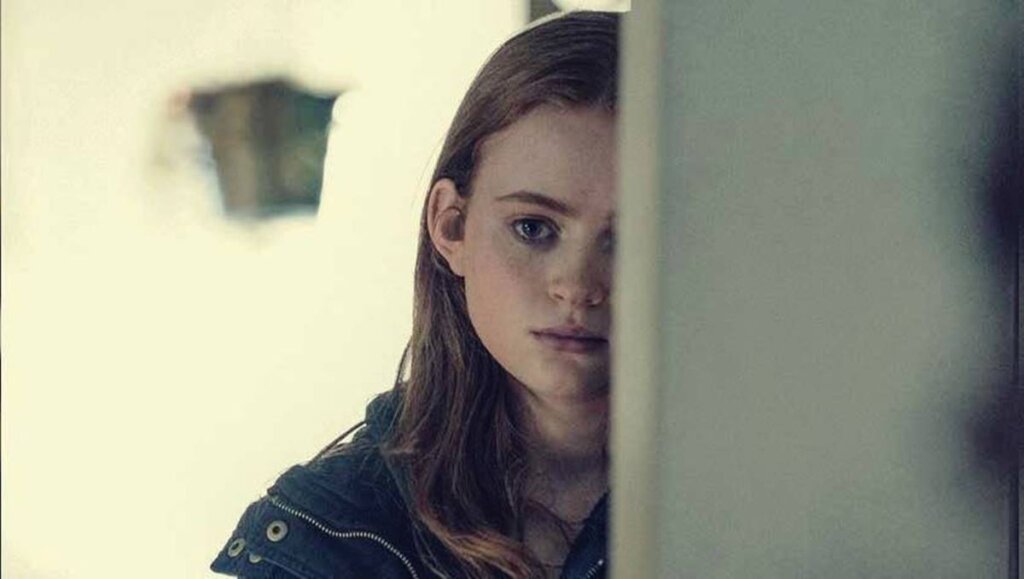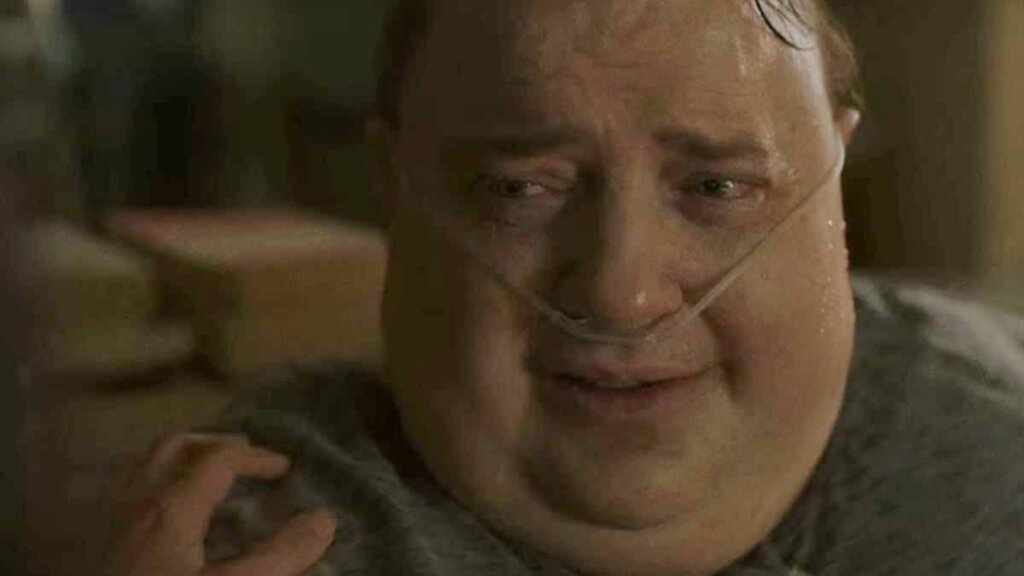The Whale: A Profound Portrait of Depression


Written and verified by the psychologist Valeria Sabater
“Who could want me to be part of their life?” This simple but devastating phrase frames one of the most recurrent perceptions of the protagonist of the latest film by Darren Aronofsky. Few directors are so skilled at bringing human emotions and torments to the surface in such a palpable way. His films are proof of this, including Black Swan, Mother, and The Whale.
The Whale is a film that narrates a tragedy contained within four walls where chills are a constant sensation. Loneliness and sadness are the mist that accompanies us in an almost suffocating way throughout the production. The pristine gaze of Brendan Fraser, encased in endless layers of prosthetic fat, provides that point of absolute tenderness in the midst of so much emotional desolation.
We’re talking about a must-see audiovisual portrait of self-abandonment. The film also communicates how our decisions, added to the behavior of our environment, can lead us to dramatic situations. It’s a film in which the supporting characters are as relevant as the main figure to understanding the canvas of a story that may be taking place in thousands of lonely homes.
“I need to know that I have done one thing right with my life!”
-The Whale-

The Whale: A crude story about our failures
The Whale is a film based on the hit play by Samuel D. Hunter. Since its premiere, it has earned constant public and critical recognition and won several awards, including Oscars for Best Actor, Best Makeup and Hairstyling, and Best Supporting Actress. One of its main attractions is the return of Brendan Fraser, who, through his face and voice, brings an unbeatable sensitivity to this creation.
The actor gets into the skin of Charlie, an English teacher who gives virtual classes to his students with the camera off. He is morbidly obese, lives in seclusion at home, and consumes copious amounts of pizza, fried chicken, milkshakes, and French fries. The director brings us closer to those moments so that we capture every detail of that immense body in an almost morbid act.
It turns us into authentic voyeurs of the messy house and bulky man, allowing us to discover something. For many, food doesn’t serve a nutritional purpose. Rather, it’s a mechanism for compulsion and self-destruction. In this regard, we can’t help but wonder what’s under that attempted annihilation and all those pounds of loneliness.
The prison of the body and the pain of life
Charlie’s life revolves around his classes, eating junk food, gay porn, and visits from his only friend and nurse, Liz. Beyond his imposing physique, we soon discover the echo of the life story that has led him to this situation. Years ago, this English teacher loved life, and he loved one of his students, for whom he ended up leaving his family.
Sadly, that young man ended up taking his own life, and that suicide, added to the burden of having abandoned his daughter, led Charlie to his own self-destruction. Food is his catharsis, and his body is the jail that encapsulates suffering, placing him on a constant precipice toward death. Only Liz, the sister of his lost partner, seeks to convince him to seek medical help.
However, as almost always happens in cases of morbid obesity, social embarrassment and the fear of rejection cause him to shy away from all clinical settings.
The search for redemption
The Whale is a movie that takes place over the course of a week. During that time, he is visited by several characters, including a bird that, metaphorically, always watches him from behind the window. We’ll meet a missionary who wants to save his soul but who judges his sexuality and a pizza delivery man who has Charlie as his best customer.
We also discover his ex-wife, who struggles with alcoholism. These motley figures orbit around Charlie like satellites, showing us that they all deal with their own razor-sharp darkness. But among all those who enter that gloomy house, Ellie’s stands out. His daughter is a teenager full of anger and contempt toward her father for having abandoned her.
Except for Liz, none of the figures around Charlie are friendly, and that tapestry of feelings makes us even more claustrophobic. Charlie symbolizes that giant on a mountain of desolation who attends the world with his kind gaze. In fact, one word we often hear him utter is “sorry.”
His self-hatred contrasts the tenderness with which he addresses his surroundings, especially his daughter. He doesn’t hesitate to excuse her unpleasant character, treats her with infinite affection, and only seeks to redeem her and give her hope so that her anger doesn’t isolate herself from the world like he did.
Charlie thinks that despite the hatred and contempt that lives in his daughter Ellie, there is still hope for her. There’s still the possibility that she’ll become a good person.

The whale and the metaphor of depression
The Whale is an emotional epic that traces the shape of depression layer by layer. Charlie is obsessed with a little literary work that someone close to him did on Herman Melville’s book, Moby Dick. We know the authorship of this essay at the end.
However, the metaphor of the whale takes us back to how Melville describes the animal in his book: A gigantic being, a sad, emotionless creature. Suffering from depression is like becoming creatures carrying immense tons of sadness, sailing lonely oceans. The pain is such that, in the end, one no longer feels anything, only the desire to flee and to let oneself sink into the depths.
On the other hand, we can’t forget that Darren Aronofsky delights in showing us the complexities of faith and religion. In the Bible, the figure of the whale is also that being that swallows people who aren’t worthy of salvation, like Jonah. Charlie lives with the wound of his conscience for not having given his best to those he loved the most.
The whale is a symbol of everything that we hide under the skin of sadness and vital failure, and that ends up destroying us.
Empathy for stigmatized people isn’t enough
This film is the starkest reflection of mental problems, sexuality, heartbreak, religious intolerance, and parenting mistakes. However, something that brings us back as a reflection is our inability to really care about others.
It’s true that Charlie’s character arouses our empathy, as can any socially stigmatized person. However, let’s keep in mind that it’s not enough to feel emotional empathy for someone to understand and be helpful. Feeling sorry for someone doesn’t save them. Knowing what’s behind morbid obesity isn’t enough either.
We must stop being spectators of the suffering of others to become active agents for those who need understanding, help, and change in their lives. In our society, there are many Charlies sailing alone through their own depressing oceans.
“Who could want me to be part of their life?” This simple but devastating phrase frames one of the most recurrent perceptions of the protagonist of the latest film by Darren Aronofsky. Few directors are so skilled at bringing human emotions and torments to the surface in such a palpable way. His films are proof of this, including Black Swan, Mother, and The Whale.
The Whale is a film that narrates a tragedy contained within four walls where chills are a constant sensation. Loneliness and sadness are the mist that accompanies us in an almost suffocating way throughout the production. The pristine gaze of Brendan Fraser, encased in endless layers of prosthetic fat, provides that point of absolute tenderness in the midst of so much emotional desolation.
We’re talking about a must-see audiovisual portrait of self-abandonment. The film also communicates how our decisions, added to the behavior of our environment, can lead us to dramatic situations. It’s a film in which the supporting characters are as relevant as the main figure to understanding the canvas of a story that may be taking place in thousands of lonely homes.
“I need to know that I have done one thing right with my life!”
-The Whale-

The Whale: A crude story about our failures
The Whale is a film based on the hit play by Samuel D. Hunter. Since its premiere, it has earned constant public and critical recognition and won several awards, including Oscars for Best Actor, Best Makeup and Hairstyling, and Best Supporting Actress. One of its main attractions is the return of Brendan Fraser, who, through his face and voice, brings an unbeatable sensitivity to this creation.
The actor gets into the skin of Charlie, an English teacher who gives virtual classes to his students with the camera off. He is morbidly obese, lives in seclusion at home, and consumes copious amounts of pizza, fried chicken, milkshakes, and French fries. The director brings us closer to those moments so that we capture every detail of that immense body in an almost morbid act.
It turns us into authentic voyeurs of the messy house and bulky man, allowing us to discover something. For many, food doesn’t serve a nutritional purpose. Rather, it’s a mechanism for compulsion and self-destruction. In this regard, we can’t help but wonder what’s under that attempted annihilation and all those pounds of loneliness.
The prison of the body and the pain of life
Charlie’s life revolves around his classes, eating junk food, gay porn, and visits from his only friend and nurse, Liz. Beyond his imposing physique, we soon discover the echo of the life story that has led him to this situation. Years ago, this English teacher loved life, and he loved one of his students, for whom he ended up leaving his family.
Sadly, that young man ended up taking his own life, and that suicide, added to the burden of having abandoned his daughter, led Charlie to his own self-destruction. Food is his catharsis, and his body is the jail that encapsulates suffering, placing him on a constant precipice toward death. Only Liz, the sister of his lost partner, seeks to convince him to seek medical help.
However, as almost always happens in cases of morbid obesity, social embarrassment and the fear of rejection cause him to shy away from all clinical settings.
The search for redemption
The Whale is a movie that takes place over the course of a week. During that time, he is visited by several characters, including a bird that, metaphorically, always watches him from behind the window. We’ll meet a missionary who wants to save his soul but who judges his sexuality and a pizza delivery man who has Charlie as his best customer.
We also discover his ex-wife, who struggles with alcoholism. These motley figures orbit around Charlie like satellites, showing us that they all deal with their own razor-sharp darkness. But among all those who enter that gloomy house, Ellie’s stands out. His daughter is a teenager full of anger and contempt toward her father for having abandoned her.
Except for Liz, none of the figures around Charlie are friendly, and that tapestry of feelings makes us even more claustrophobic. Charlie symbolizes that giant on a mountain of desolation who attends the world with his kind gaze. In fact, one word we often hear him utter is “sorry.”
His self-hatred contrasts the tenderness with which he addresses his surroundings, especially his daughter. He doesn’t hesitate to excuse her unpleasant character, treats her with infinite affection, and only seeks to redeem her and give her hope so that her anger doesn’t isolate herself from the world like he did.
Charlie thinks that despite the hatred and contempt that lives in his daughter Ellie, there is still hope for her. There’s still the possibility that she’ll become a good person.

The whale and the metaphor of depression
The Whale is an emotional epic that traces the shape of depression layer by layer. Charlie is obsessed with a little literary work that someone close to him did on Herman Melville’s book, Moby Dick. We know the authorship of this essay at the end.
However, the metaphor of the whale takes us back to how Melville describes the animal in his book: A gigantic being, a sad, emotionless creature. Suffering from depression is like becoming creatures carrying immense tons of sadness, sailing lonely oceans. The pain is such that, in the end, one no longer feels anything, only the desire to flee and to let oneself sink into the depths.
On the other hand, we can’t forget that Darren Aronofsky delights in showing us the complexities of faith and religion. In the Bible, the figure of the whale is also that being that swallows people who aren’t worthy of salvation, like Jonah. Charlie lives with the wound of his conscience for not having given his best to those he loved the most.
The whale is a symbol of everything that we hide under the skin of sadness and vital failure, and that ends up destroying us.
Empathy for stigmatized people isn’t enough
This film is the starkest reflection of mental problems, sexuality, heartbreak, religious intolerance, and parenting mistakes. However, something that brings us back as a reflection is our inability to really care about others.
It’s true that Charlie’s character arouses our empathy, as can any socially stigmatized person. However, let’s keep in mind that it’s not enough to feel emotional empathy for someone to understand and be helpful. Feeling sorry for someone doesn’t save them. Knowing what’s behind morbid obesity isn’t enough either.
We must stop being spectators of the suffering of others to become active agents for those who need understanding, help, and change in their lives. In our society, there are many Charlies sailing alone through their own depressing oceans.
This text is provided for informational purposes only and does not replace consultation with a professional. If in doubt, consult your specialist.







